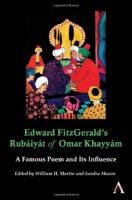Avicenna als Vorläufer “Omar Chajjams“. Christian H. Rempis
In: Orientalistische Studien: Enno Littmann zu seinem 60. Geburtstag am 16. September 1935 überreicht von Schülern aus seiner Bonner und Tübinger Zeit. 1935, p. 149–156
Archives
Fitz Gerald und Omar Khajjam
Fitz Gerald und Omar Khajjam. Joseph Steinmayer
In: Süddeutsche Monatshefte, Juni 1911, p. 710–726
Discusses influence of Persian literature and how FitzGerald treated the quatrains that he translated. Steinmayer also compares a number of FitzGerald’s translation with corresponding quatrains in Whinfield (translated into German)
Untersuchung zur Rezeption persischer Lyrik in der europäischen Kunstmusik
Untersuchung zur Rezeption persischer Lyrik in der europäischen Kunstmusik am Beispiel der Werke von Saʿdī, Ḥāfeẓ und ʿOmar Ḫayyām. Elgaz Pegah. Heidelberg : Universitätsbibliothek Heidelberg, 2024.
Omar Khayyám en de Rubaiyat in vertaling en romans
Omar Khayyám en de Rubaiyat in vertaling en romans. Kees Hendrikse
In: Boekenpost 10 (2002), 61, p. 34–35
In de serie onder de titel BOEKBOEKEN bespreekt Kees Hendrikse bekende en minder bekende schrijvers met hun boeken over mensen die boeken lezen, schrijven, drukken of verkopen: Garfield, Canetti, Bradbury, Hanff, e.a. Dit keer de apocriefe lotgevallen van een wereldberoemde tekst.
Rubaiyat EI-Khayyam zwischen den deutschen und den arabischen Übersetzungen
Rubaiyat EI-Khayyam zwischen den deutschen und den arabischen Übersetzungen. Fausia Hassan
In: Revue Traduction et Langues, 2 (2003), 1, p. 22–42
Al-Khayyam between the Arabic and German translations -This work deals with the Rubaiyat of Omar Al -Khayyam. -We will cover the life and work of Omar AlKhayyam in general, emphasizing his importance and influence on other poets. A general overview of the different translations is given. It is further examined to what extent the Arabic translations differ from the German translation and where there is a comparison. The question is also asked whether the difference involves social, political or other aspects. With 50 quatrains quoted from the translation by Mohamed Abou-Zaid.
Pessoa, Borges and Khayyam
Pessoa, Borges and Khayyam. Fabrizio Boscaglia
Variaciones Borges, 2015, nr. 40, pp. 41–64.
The fascinating possibility of an encounter between Pessoa and Borges in Lisbon, in May 1924, at the end of Borges’s second trip in Europe, has been the departing point for some comparative readings on these authors (Rodriguez Monegal 15-16; Ferrari and Pizarro 91; Balderston 168). The author wants to imagine that, if it had happened, they would have discussed, among other things, a work which both would later mention in their upcoming publications and that would become an important reference to both of them. It is the Rubaiyat of the Persian poet and philosopher Omar Khayyam (1048-1131), in the famous English translation by the English poet Edward FitzGerald (1809-1883), first published in 1859.
Edward FitzGerald’s Rubáiyát of Omar Khayyám. A famous poem and its influence
Edward FitzGerald’s Rubáiyát of Omar Khayyám. A famous poem and its influence. Edited by William H. Martin and Sandra Mason. London; New York; Delhi, Anthem press, 2011. xi, 170 p. ISBN: 9780857287700.
